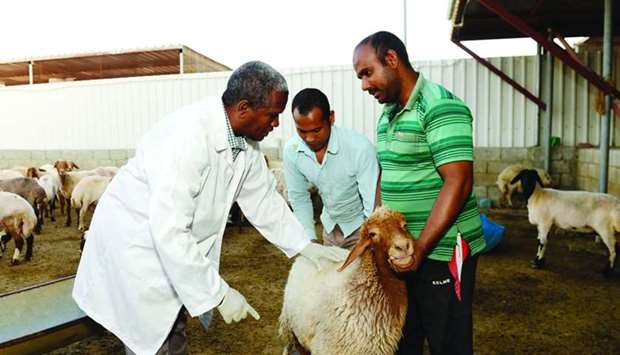The Ministry of Municipality and Environment (MME) has been carrying out a strategy to develop barns complexes in the country, open new markets and launch new initiatives to support livestock wealth, Livestock Department director engineer Abdulaziz al-Ziyarh told Qatar Radio Monday.
Participating in the popular morning programme, 'My Beloved Country Good Morning,' he explained that livestock is considered an important natural resource in Qatar and a key strategic food stock, which make it necessary to use the available barns in the country in the best possible way to make them productive and participate in achieving the targeted food security with regard to animal products.


The official pointed out that the MME has launched a number of initiatives in this direction, which include creating barns markets in co-operation with Qatar Development Bank. These markets have veterinary clinics and pharmacies, and shops for selling fortified fodder and green fodder.
In addition, the MME has opened yards for selling produce from livestock farmers directly at
Al Mazrouah and Al Shamal. More yards will be open at Al Khor, Al Sheehaniya and Abu Nakhla. There is also an initiative to encourage the local production of sheep by selling livestock to Widam Food Company during the holy month of Ramadan and Eid al-Adha, and another initiative to fatten sheep at the barns complexes. Ten of these projects were offered to the private sector.
Al-Ziyarh pointed out there is a comprehensive project for veterinary services including the establishment of well-equipped veterinary quarantine facilities at different areas in the country to protect livestock against infectious diseases, development of veterinary laboratories, and opening more veterinary clinics, besides mobile clinics to reach out to more places.
The official stressed that the MME gives livestock owners various free services and supports them in different ways including subsidised fodder, easy loans, subsidised water and electricity and free veterinary services and vaccines, in addition to other necessary materials and equipment.
He said that the country has achieved 100% self-sufficiency in dairy and poultry products, 34% in eggs, 18% in red meat and there are plans to increase the production further. For example, egg production is expected to reach 70% self-sufficiency by the end of 2022 and red meat 30% by the same period.
Al-Ziyarh stressed that the private sector plays a key role through various projects in the field. There is also a project for two factories to recycle livestock waste, two factories for fortified fodder and a chicken hatchery project.

A mobile veterinary clinic

Interior of a mobile veterinary clinic

Interior of a mobile veterinary clinic

A livestock barn
The official pointed out that the MME has launched a number of initiatives in this direction, which include creating barns markets in co-operation with Qatar Development Bank. These markets have veterinary clinics and pharmacies, and shops for selling fortified fodder and green fodder.
In addition, the MME has opened yards for selling produce from livestock farmers directly at
 Engineer Abdulaziz al-Ziyarh |
Al-Ziyarh pointed out there is a comprehensive project for veterinary services including the establishment of well-equipped veterinary quarantine facilities at different areas in the country to protect livestock against infectious diseases, development of veterinary laboratories, and opening more veterinary clinics, besides mobile clinics to reach out to more places.
The official stressed that the MME gives livestock owners various free services and supports them in different ways including subsidised fodder, easy loans, subsidised water and electricity and free veterinary services and vaccines, in addition to other necessary materials and equipment.
He said that the country has achieved 100% self-sufficiency in dairy and poultry products, 34% in eggs, 18% in red meat and there are plans to increase the production further. For example, egg production is expected to reach 70% self-sufficiency by the end of 2022 and red meat 30% by the same period.
Al-Ziyarh stressed that the private sector plays a key role through various projects in the field. There is also a project for two factories to recycle livestock waste, two factories for fortified fodder and a chicken hatchery project.

